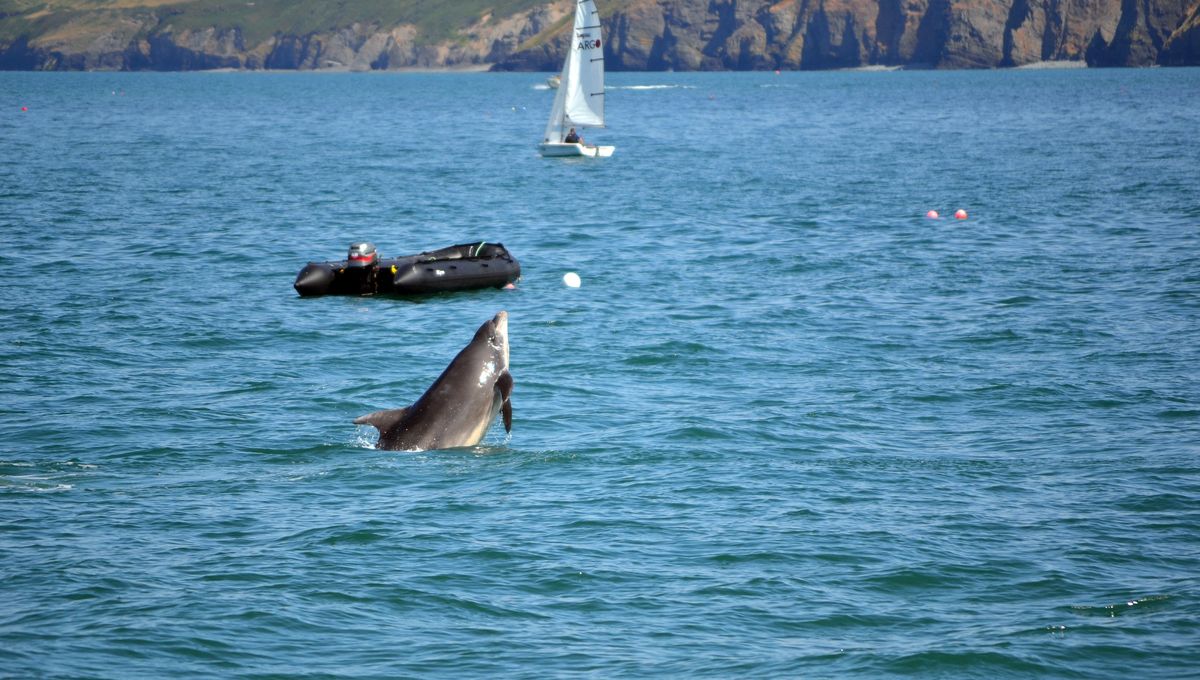
The sole dolphin living in the Baltic Sea isn’t letting the lack of company silence him. Quite the opposite – he’s chatting away, emitting bursts of sounds of the type members of his species use to communicate, rather than to catch food, but with more diversity. The observations provide an insight into the psychology of a normally social creature when it finds itself alone, and feel rather familiar.
We know that humans have an urge to communicate that doesn’t go away just because we happen to be alone. The film Castaway’s success can partly be attributed to the fact that most of us can imagine that if we were stuck on an island for long enough without company, we might start talking to a volleyball as well.
As animals form larger social groups, their communication becomes more complex and sophisticated. The Baltic dolphin provides an unusual chance to test if one of the animals whose intelligence most closely resembles our own is similarly driven to communicate, even when there is no one to hear.
Nicknamed Delle by locals to the Svendborgsund channel between two Danish islands, the dolphin has spent four years as the Baltic Sea’s only bottlenose dolphin – the first three in Svendborgsund, and the rest off the German coast. Even his kind’s penetrating underwater noises would not be able to reach his nearest neighbors hundreds of kilometers away, and he could not hear them.
Many social animals cannot survive for long in the wild on their own. Studying how talkative animals are in captivity may be skewed by the fact the animals may take to talking to their human captors as if they were members of their own species, making Delle an unusual opportunity.
A team led by Dr Olga Filatova of the University of Southern Denmark listened in on Delle’s noises for two months using a Soundtrap ST-500 underwater recorder placed at a favorite spot for Delle to visit, despite its proximity to a busy ferry terminal.
“We expected that he would produce few, if any, communicative sounds in the absence of potential recipients,” the authors write. “Contrary to this expectation, we found the dolphin to be highly vocal, emitting burst-pulse and tonal sounds in rhythmic bouts.”
The sounds were not an exact match for those a dolphin in a pod would make, however. Most dolphins are thought to have their own distinctive whistle, which others can use to recognize them, but Delle had three – raising the question of whether he was inventing two invisible friends to talk to. Alternatively, however, the authors propose the “one dolphin, one whistle” rule may need re-examining, as it’s often been assumed in cases where dolphins are so numerous that distinguishing their sounds is hard.
Delle also produced three regular signals that combined two sounds together, such as two whistles or a whistle associated with a low frequency tone. At least one of these is unlike any previously known dolphin sound.
This behavior may be “a byproduct of dolphins’ intrinsic need for social interaction,” the authors suggest. We think that is probably a scientific way of saying Delle may be inventing other dolphins to have conversations with.
If that seems too much like anthropomorphizing, the authors raise two other possibilities. Be warned, however, one is even sadder. The sounds might be being “emitted unintentionally as emotional signals”. Someone get that dolphin a volleyball.
Alternatively, the authors propose there may be a function to dolphin-speak besides direct communication.
A human swimmer sometimes kept Delle company, and harbor porpoises live in the channel, but it doesn’t seem most of the sounds were directed at either.
Useful as this natural experiment may be, it’s always difficult to tell how representative an individual in odd circumstances might be. Was Delle on his own because he just got lost and couldn’t find his way back to the pod, or was he cast out because a dolphin with three separate whistles freaked the others out? Perhaps some eccentricity led him to prefer being alone.
There’s a final twist to the story. Distinctive markings on the Baltic dolphin’s dorsal fin led researchers to identify him as individual #1022 from a well-studied pod off Scotland, born in 2007. Before his great migration, #1022 had been given a different name, Yoda. Suddenly his isolation, and the unusual nature of his sounds makes sense: Svendborgsund is the dolphin equivalent of Dagobah, and nominative determinism applies to dolphins too, at least when it comes to talking funny.
The study is published in Bioacoustics.
[H/T: Phys.org]
Source Link: Lacking Company, A Dolphin In The Baltic Is Talking To Himself